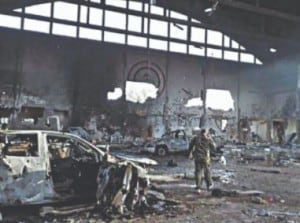Praveen Swami
In April 2018, the Israeli Air Force struck at the Tiyas (T-4) Air Base, near the Syrian city of Homs, targeting a single hanger housing surveillance drones and a yet-to-be-installed Iranian-supplied Tor air defence missile system. Photographs show the warheads gutted the inside of the hanger but left only tears on its metal skin. The structure, despite the multiple hits, remained almost intact.
For the Indian Air Force (IAF), under siege ever since independent satellite analysts claimed that there is no evidence that its February 26 air strike hit the Jaish-e-Mohammed training base in Balakot, those images are good news.
The IAF has, in off-record briefings, been pointing to tears on the roof of one of the northern buildings of the complex as evidence that it did indeed hit its targets. Its Spice 2000 bombs, the IAF says, carried 80-kg fragmentation warheads, similar to those used at Tiyas.
Part of the reason few have been listening, though, is that the T-4 images—along with other imagery available with the government—haven’t been circulated. Indeed, the government put out no technical data at all to back its case. That points to one of the important deficits in India’s national security responses: credibility.
Telling the truth has long been a struggle for India’s national security establishment—even when there are few costs of doing so. Even data which will become available through government websites or is already in the public domain is reflexively denied.
An Iranian facility in Syria. Source: Haaritz
 “Phone me when I’m having coffee in Khan Market and ask where I am,” says one bureaucrat jokingly, “and I’ll insist I’m at the other end of city. I’ve become psychologically incapable of telling the truth even when there’s no reason to lie.”
“Phone me when I’m having coffee in Khan Market and ask where I am,” says one bureaucrat jokingly, “and I’ll insist I’m at the other end of city. I’ve become psychologically incapable of telling the truth even when there’s no reason to lie.”
Israel, by contrast, routinely releases satellite imagery and video as evidence in support of strikes it acknowledges the country conducted—a tool both to undermine denials by its adversaries and to block propaganda on civilian fatalities. For the most part, the US and the UK follow the same practice. The case against this practice is that it’s hard to hide the facts when things go wrong, but experience has taught these democracies that the benefits outweigh the costs.
India’s credibility crisis after Balakot illustrates the point. In Pakistan, India’s claims now have no credibility. This means at least one important objective—persuading Pakistani public opinion of the costs of allowing jihadists to operate—has failed despite the IAF’s stellar operation. It’s also opened the way for a divisive, bitter political battle at home.
This is true to pattern. For example, New Delhi hasn’t publicly revealed that the IAF is investigating credible claims that the Mi-17V5 helicopter shot down over Budgam, Jammu and Kashmir, on 27 February may have been brought down by the country’s own air defence system. Pilots on the helicopter, IAF sources say, were cleared to land just as air defence systems at Humhama and Awantipora airbases went on high alert in response to Pakistan’s counterstrikes, leading to a missile operator firing in error.
Tragic as such incidents are, the so-called friendly fire is a routine part of war: a staggering 24 percent of all US military fatalities in the first Gulf War were inflicted by its own forces. There, however, public disclosure led to improvements in operating practices and procedures.
In India, the bureaucratic impulse is to cover up or scapegoat, often with disastrous consequences, not the least of which is that hushed-up good-faith errors become fodder for conspiracy theories. Economy with the truth costs lives. In Kargil, a large body of military history now tells us, the army leadership pushed under-prepared formations into combat to cover up its mistakes. Political leaders, similarly, are known to have made serious strategic misjudgments on Kashmir, leading to unacceptable escalations in Indian military fatalities.
The standard response to these criticisms is that we ought not question the armed forces.
It’s worth considering, though, where not asking questions takes us. In the build-up to the 1962 war, a servile media failed to confront then-Prime Minister Jawaharlal Nehru and the cabal of pet Generals around him on strategy and military preparedness. The consequence was national humiliation.
Firstpost is now on WhatsApp. For the latest analysis, commentary and news updates, sign up for our WhatsApp services. Just go to Firstpost.com/Whatsapp and hit the Subscribe button.
No comments:
Post a Comment